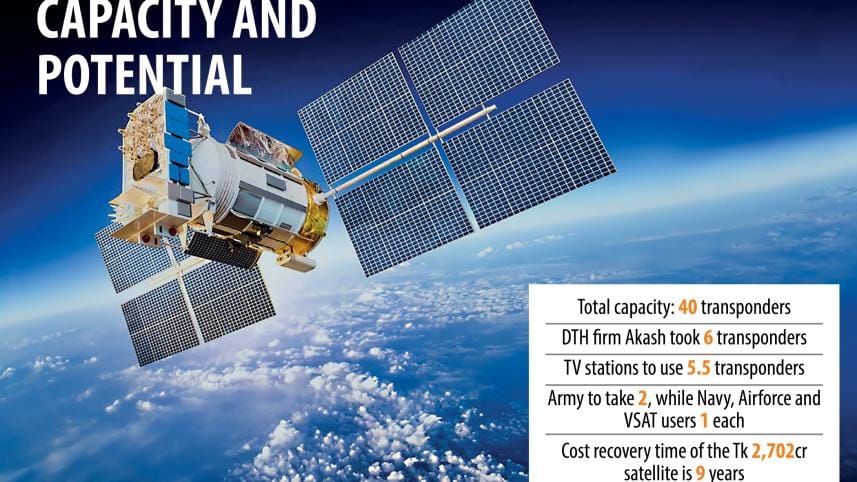Bangabandhu-1 to recover cost in nine years

Bangabandhu-1 satellite will be raking in Tk 125 crore a year after 26 percent of its capacity was lent out -- a development the Bangladesh Communication Satellite Company (BCSCL) deems to be satisfactory.
The satellite was launched into orbit on May 12 last year at a cost of Tk 2,765 crore, which was supposed to be recouped in eight years’ time as per the project proposal.
BCSCL got control of the satellite in February this year.
“In nine months we have done quite well,” said Shahjahan Mahmood, chairman of BCSCL, at a press briefing at his office yesterday.
He went on to express satisfaction that all 31 television channels in Bangladesh are now broadcasting via the Bangabandhu-1.
The country’s lone satellite still has 74 percent of the capacity left, so the BCSCL has the chance to earn upwards of Tk 200 crore more, he said.
The company is set to sign deals for another 25 percent of the capacity over the next couple of months.
As per the original plan, BCSCL had wanted to lend out 50 percent of the capacity to international operators.
“But the international market is very competitive, which is why we are focusing on the local market. We are seeing huge demand here -- the local market is much bigger than our primary estimation and it is growing at quite a high rate.”
At the same time, BCSCL is courting the regional markets, according to Mahmood.
Negotiations are going on with two companies from Nepal and the Philippines. They are keen on taking nine transponders, which is almost 25 percent of the total capacity of the satellite.
“We have done a very conservative calculation about the remaining unsold capacity and we have estimated it will take hardly nine years to recover the total cost of the Bangabandhu-1 satellite.”
BCSCL got Bangladesh Television as their first client and the government-owned television channel is paying Tk 18 crore a year.
The satellite company will also earn Tk 60 crore from the other private television channels and Tk 4 crore each from the shipping ministry and fisheries ministry.
Beximco’s direct-to-home service Akash is paying a sizeable sum too, Mahmood said, while declining to disclose the exact deal value.
Meanwhile, preparations are in full swing for the launch of the country’s second satellite, expected by 2023.
An international consultant will be appointed within the next 2-3 months to run a feasibility study to gauge the demand, Mahmood said.
Since the first one is a communication satellite, the second one will be a hybrid model such that it can be used for weather forecast, surveillance and other activities.
Currently, Bangladesh has four applications for orbital slot, so the second satellite would be launched into that position, Mahmood said.
The government is going to award the licence for another nine television channels and they will have to run their programmes using the satellite. BCSCL is expected to Tk 15 crore yearly from them.
BCSCL Managing Director Shariar Ahmed Chowdhury and senior officials were also present at the event.



 For all latest news, follow The Daily Star's Google News channel.
For all latest news, follow The Daily Star's Google News channel.
Comments